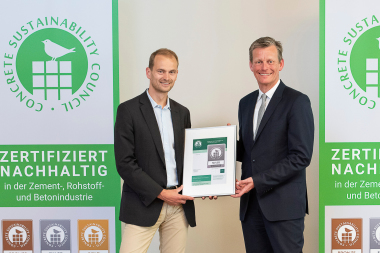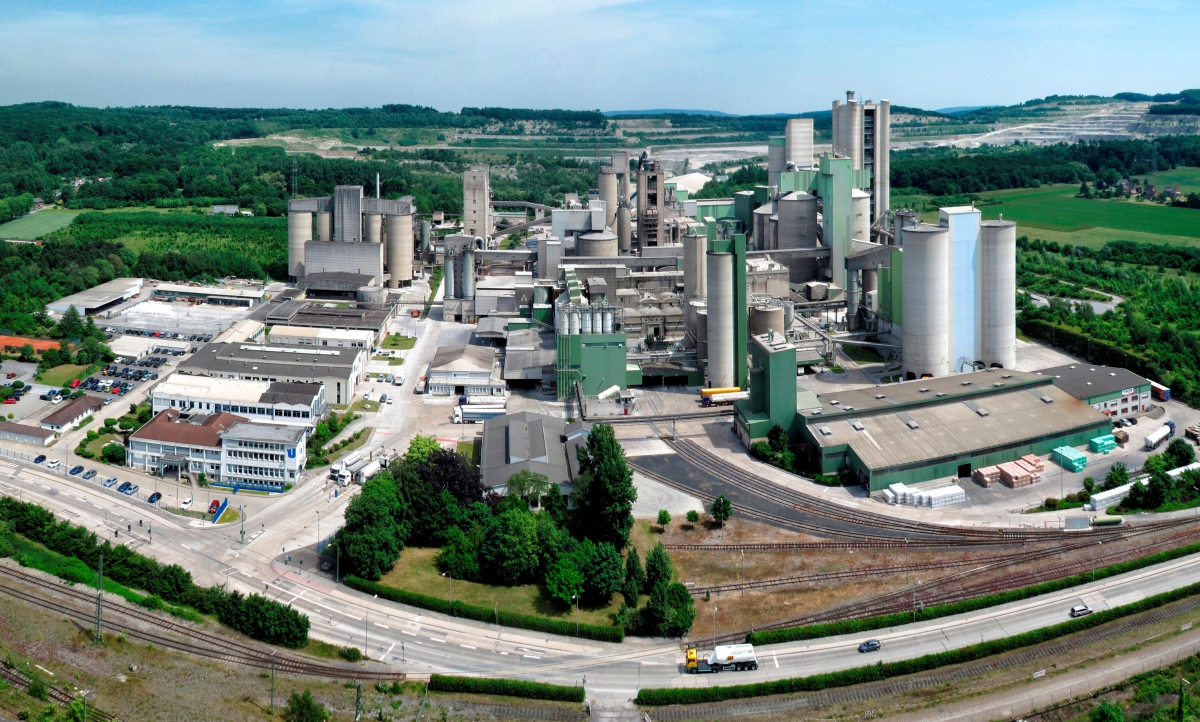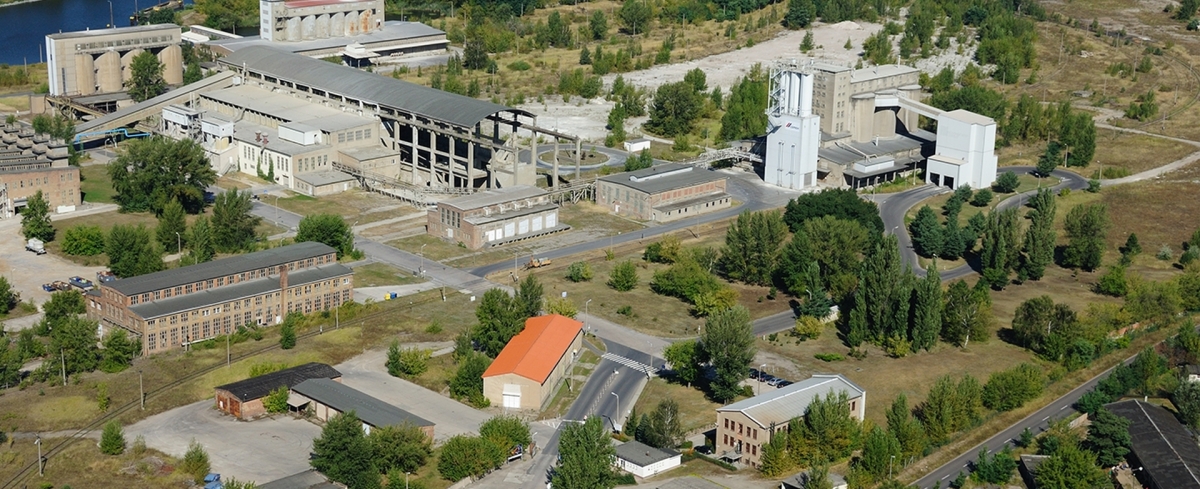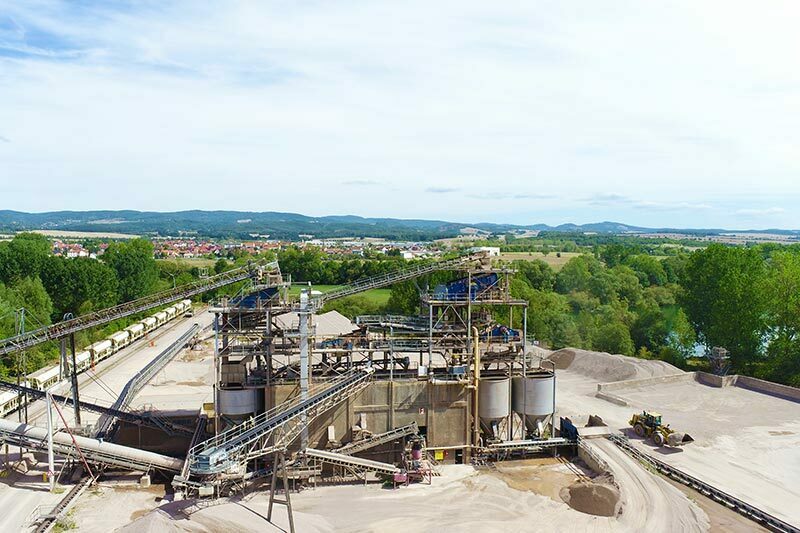In focus: The new ECODUR product family – certified according to the CSC CO2 module
14.12.2023The right solution for the requirements of sustainable construction
The issues surrounding sustainable construction with cement and concrete and the necessary CO2 reductions are currently dominating the industry. Consequently, these topics were also the focus of the Dyckerhoff Beton WEB event, which was broadcast live from the studio on the Dyckerhoff factory premises in Wiesbaden at the beginning of December. In addition to representatives from important industry associations, Dyckerhoff experts in particular informed the audience about the new ECODUR concretes, with which Dyckerhoff will be offering an entire product family of CO2-optimized concretes in the future.
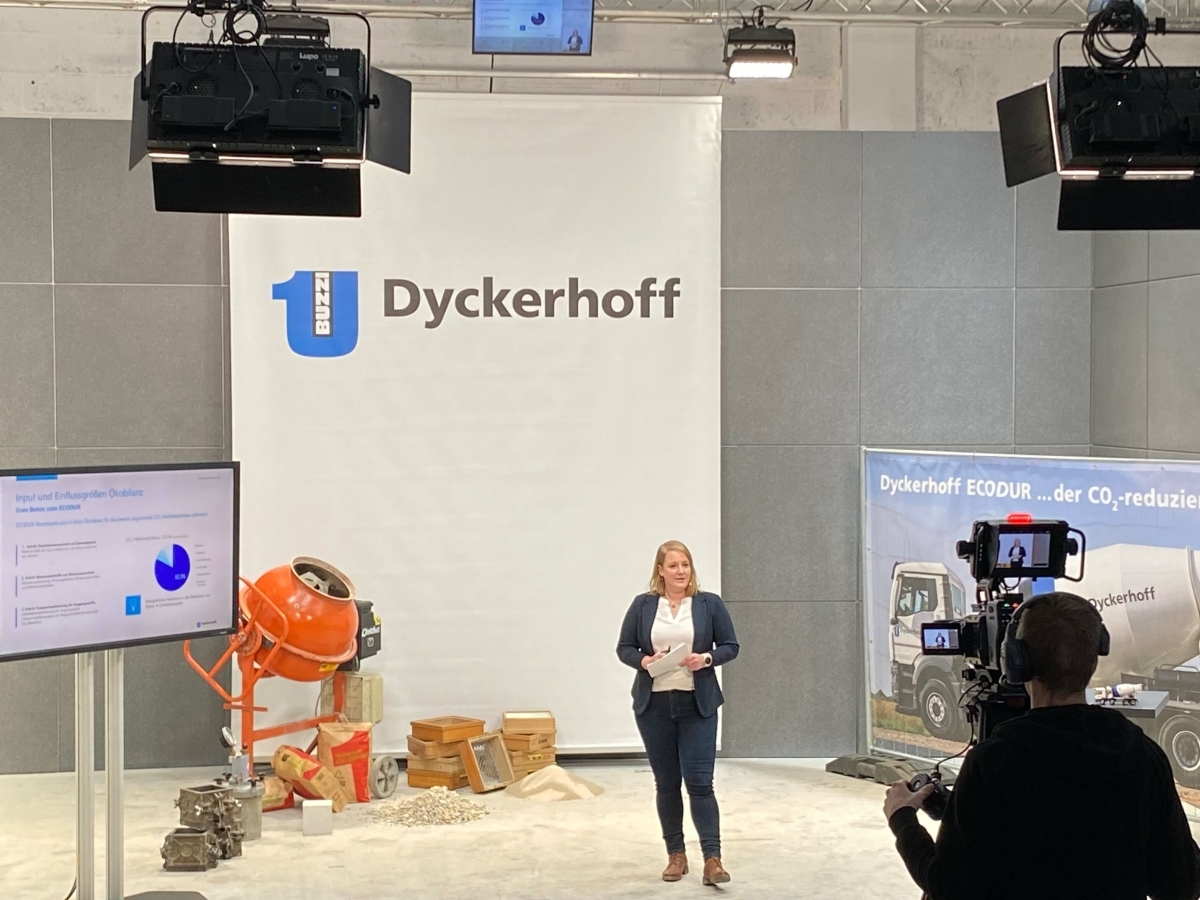 The Dyckerhoff online event focused on the new CO2-reduced ECODUR concretes
The Dyckerhoff online event focused on the new CO2-reduced ECODUR concretes
Copyright: Dyckerhoff GmbH
Dr. Matthias Derstroff, Managing Director of Dyckerhoff Beton GmbH & Co. KG, welcomed almost 200 participants live to this year’s Beton WEB event. Moderated by Marketing Manager Martin Möllmann, they learned about the solutions that Dyckerhoff Beton will be offering in the future in the form of the new ECODUR product family. Dr. Christoph Müller, Managing Director of VDZ Technology gGmbH in Düsseldorf, first demonstrated the basis for the development of the new concretes with his presentation on “Sustainable construction with CO2-efficient cements and concretes”. According to Dr. Christoph Müller, the path to the decarbonization of cement and concrete and thus to sustainable construction with concrete initially leads via CO2-efficient cements, concretes and constructions. He showed in detail how cements are already being produced and used in a resource-efficient manner, as well as the further development towards even more efficient cements (CEM X), which are not yet covered by the current standards.
In a second presentation on “CSC certification and the effects of the CO2 module on concrete production”, Andreas Tuan Phan, Managing Director of Research at the German Ready-Mixed Concrete Association (Bundesverband der Deutschen Transportbetonindustrie e.V. – BTB) in Berlin, presented the Concrete Sustainability Council (CSC) and its certification system. In particular, he referred to the intensive exchange between the CSC and the operators of certification systems for sustainable buildings: by recognizing the CSC label, the use of CSC-certified concretes in building certification systems such as DGNB and BREEAM is honoured with additional points. The CO2 add-on module in particular, which divides the CO2-optimized concretes into a total of four CO2 classes (levels), creates transparency and credibility, according to the speaker. And this is exactly where the new Dyckerhoff ECODUR concretes come in, according to Dr. Julia Scheidt, Product Manager Concrete and Building Consultant at Dyckerhoff. The CSC-certified ECODUR concretes now form a complete product family of “sustainable concretes” and therefore represent "the right solution for all sustainable construction requirements". The ECODUR formulas are optimized in their eco-balance for the respective targeted CO2 reduction level, with the choice of cement being the decisive lever here alongside other measures. The names of the new concretes are also based on the respective CO2 reduction levels offered and certified by the CSC system. For example, ECODUR 30 emits at least 30% less CO2 compared to the industry reference value and therefore corresponds to level 1 of the CSC CO2 module. With ECODUR 40, the CO2 reduction is at least 40% compared to the industry reference value (corresponds to level 2 of the CSC CO2 module). Consequently, at least 50% less CO2 is emitted during the production of ECODUR 50 compared to the industry reference value (corresponds to level 3 of the CSC CO2 module). In her further explanations, Dr. Julia Scheidt went into detail on the question of which of the new ECO-DUR concretes is suitable for which applications – always against the background that CO2 reduction and sustainability certification of buildings are now also becoming increasingly present in tenders. ECODUR 30 can be used in the same way as the usual standard concretes in terms of test age, early strength development, curing time and workability. ECODUR 40 are concretes with a good balance between CO2 reduction and low impact on the construction process. These concretes tend to have a slower strength development, which must be taken into account for stripping periods and curing. The use of CEM III/B cements or, in future, CEM X cements also makes it possible to use ECODUR 50 across the board. Even an ECODUR 60 is already feasible today, even if such a high CO2 reduction at level 4 of the CSC CO2 module is currently certainly “not suitable everywhere, not at all times and only for limited applications”.
In her conclusion, the speaker once again summarized the advantages of the new Dyckerhoff ECODUR concretes for customers: Externally tested CO2-optimized level concretes in accordance with the CSC system, which have all the necessary data for further offsetting in the building life cycle assessment and are recognized in the established building certification systems, not only ensure transparency and relief, but also safety and added value - and with their clear alignment to the common goal of decarbonizing concrete construction, thus also for the desired sustainability. Last but not least, customers also benefit from the company’s many years of experience in the use of clinker-efficient cements. “With the new ECODUR family, we want to think ahead and make sustainable construction as pleasant as possible for our customers,” is Dyckerhoff's promise. The company is available for a “detailed dialog with customers” and feels well prepared for the upcoming challenges. The new concretes will be available from the beginning of 2024.
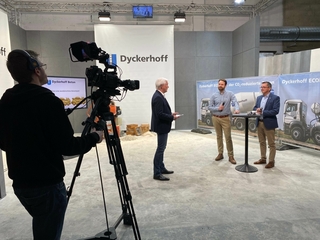 The Dyckerhoff customer portal for uncomplicated concrete ordering and tracking of the invoicing and delivery process was also presented
The Dyckerhoff customer portal for uncomplicated concrete ordering and tracking of the invoicing and delivery process was also presented
Copyright: Dyckerhoff GmbH
The WEB event was rounded off with the presentation of the Dyckerhoff customer portal for online concrete ordering, a new web application whose contents and advantages were explained by Kristjan Lehnert from Dyckerhoff IT and Michael Lazik, Regional Manager West and Netherlands at Dyckerhoff Beton, at the end of the event.

